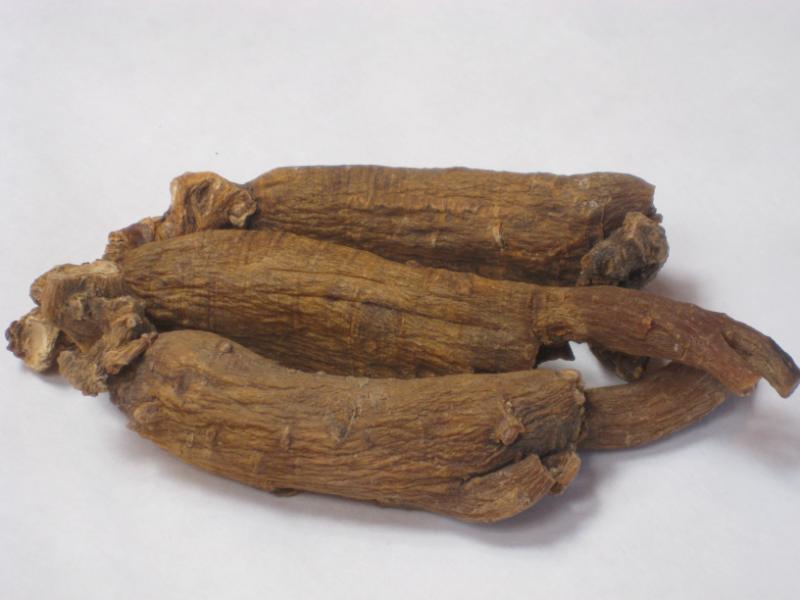Search in medicinals
Ginseng Radix
Ginseng
人参 〔人參〕 rén shēn

Alternate Chinese names: 人衔 rén xián; 土精 tǔ jīng; 东洋参 dōng yáng shēn; 神草 shén cǎo
Kingdom: Plant
Origin in PRC Pharmacopoeia: Panax ginseng C.A. Mey. (PRC Pharmacopoeia)
Origin in unofficial sources: Panax ginseng C.A. Mey.
Use: Medicinal
Category: Supplementing agents / Qì-supplementing agents
Properties: Sweet, slightly bitter; slightly warm.
Channel entry: Heart, lung, and spleen channels. (some sources add kidney channel.)
Actions and indications:
- Greatly supplements original qì: Extreme qì vacuity verging on desertion.
- Supplements lung qì: Lung qì vacuity, possibly with shortness of breath, hasty panting, laziness to speak, a faint low voice, a weak pulse, and spontaneous sweating.
- Supplements the spleen: Spleen qì vacuity, possibly with fatigue and lack of strength, reduced eating, and sloppy stool.
- Engenders liquid: Febrile disease with damage to both qì and liquid; dispersion-thirst.
- Quiets the spirit and sharpens the wits (improves mental faculties): Patterns of qì and blood depletion with heart palpitation, insomnia, or forgetfulness.
- Additional actions and indications: Rén shēn also treats impotence due to insufficiency of kidney qì.
- Finally, rén shēn is used to support right qì in combination with medicinals that dispel evil. This is used for patterns of either internal evil repletion and
right qì vacuity or external contraction with constitutional vacuity.
Dosage and method: Oral: 1.5–9g.
Warnings:
- Rén shēn is unsuitable for repletion patterns and patterns of depressed fire and should not be used in steaming bone with heat effusion, blood heat with vomiting of blood (blood ejection) or nosebleed, and ascendant hyperactivity of liver yáng with red eyes and dizziness.
- Rén shēn is traditionally said to clash with lí lú (Veratri Nigri Radix et Rhizoma) and is also said to fear wǔ líng zhī (Trogopteri Faeces).
- It is also said that lái fú zǐ (Raphani Semen) reduces its efficacy; however, lái fú zǐ was traditionally used to resolve distension and fullness if it developed after taking rén shēn.
- The efficacy of rén shēn is also said to be reduced by drinking tea or by eating Chinese radish (daikon).
Product description: This product is the 4–5-year-old root of the ginseng plant, washed, stripped of fine roots, and sun or oven dried. It is cylindrical or spindle-shaped, often dividing into two branch roots. The overall length is 5–20 cm. The surface is a pale or whitish or yellowish brown and bears longitudinal creases. It is hard and breaks with difficulty to reveal a granular fracture with the resin ducts appearing as brown speckles. For decoction, it is cut into fine oblique slices, on which an annular marking clearly delineates the woody core.
Quality: Undamaged roots with large branches, a long stem base, fine yellowish skin, and fine but pronounced wrinkles are the best.
Production area: China, North and South Korea, and Japan.
Etymology: Rén shēn 人参, literally man root,
describes the shape this item often takes. The English name ginseng derives from the Chinese.